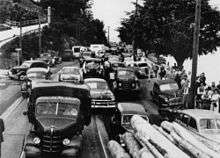Kingsford Smith Drive, Brisbane
| Kingsford Smith Drive Queensland | |
|---|---|
 | |
| Kingsford Smith Drive at Hamilton, May 2015 | |
| General information | |
| Type | Road |
| Length | 7 km (4.3 mi) |
| Route number(s) |
|
| Major junctions | |
| Southwest end | Albion |
| Northeast end | Pinkenba |
| Location(s) | |
| Major suburbs | Hamilton, Eagle Farm |
| |
Kingsford Smith Drive is a major road in Brisbane. The road was named after the aviator Charles Kingsford Smith. It connects the suburb of Pinkenba to the Brisbane central business district at the Breakfast Creek. Kingsford Smith Drive is one of the busiest roads in Brisbane, carrying an average of 61,773 vehicles per day between July and December 2014.[1]
History

The first road along the northern bank of the Brisbane River was constructed in 1829/1830.[2] Convict labour was used to connect the main settlement to the women's gaol at Eagle Farm.[2] In 1882, the road was still no better than a rough bush track.[3]
The road was then known as Hamilton Road in one part and Eagle Farm Road in another part. In 1938, it was renamed Bailey Memorial Avenue in honour of John Frederick Bailey, Queensland Botantist and curator of the Botanic Gardens.[4] However, this name was not used in practice and, in 1953, the road was again renamed after Charles Kingsford Smith[5] although the idea of renaming it had been proposed back in 1938 when the Bailey Memorial Avenue was proposed.[6]
The road was once the major access route to Brisbane's old airport terminals. In 2002 the Inner City Bypass, Brisbane was opened. This bypass allowed traffic joining the Pacific Motorway to avoid the smaller and sometimes congested city streets.
Route
The route runs along Hamilton Reach of the Brisbane River from Albion via Hamilton, before passing under the Gateway Motorway at Eagle Farm and continuing to Pinkenba. At Hamilton the Kingsford Smith Drive meets Racecourse Road at a T-intersection. During the annual Bridge to Brisbane the road is temporarily closed in one direction.
Congestion

In February 2007 it was announced by the Queensland Government that the road was to receive a major upgrade and that traffic rates were estimated at 67,000 vehicles a day.[7] Traffic volumes on the road are increasing. This has led to a drop in the average speed on the road from 45 kilometres (28 mi) per hour in 2008 to 36 kilometres (22 mi) per hour in 2009.[8] The Airport Link tolled tunnel project is expected to reduce traffic volumes by 12%.[9]
See also
References
- ↑ Kristian Silva (18 March 2015). "Brisbane traffic increasing, report shows". Brisbane Times. Fairfax Media. Retrieved 18 March 2015.
- 1 2 Gregory, Helen (2007). Brisbane Then and Now. Wingfield, South Australia: Salamander Books. pp. 128–129. ISBN 978-1-74173-011-1.
- ↑ Cole, John R. (1984). Shaping a city. Albion, Queensland: William Brooks Queensland. p. 16. ISBN 0-85568-619-7.
- ↑ "Plans For Wider Roadways". The Courier-Mail. Brisbane: National Library of Australia. 30 March 1939. p. 3. Retrieved 15 March 2011.
- ↑ "Hamilton Road". The Courier-Mail. Brisbane: National Library of Australia. 3 July 1953. p. 3. Retrieved 15 March 2011.
- ↑ "Kingsford Smith Avenue Wanted". The Courier-Mail. Brisbane: National Library of Australia. 17 September 1938. p. 4. Retrieved 15 March 2011.
- ↑ Wardill, Steven; Chalmers, Emma (26 February 2007). "Up for sale". The Courier-Mail. Retrieved 10 March 2008.
- ↑ Tony Moore (November 2010). "East West Link v Kingsford Smith Drive: The great infrastructure stand-off". Brisbane Times. Fairfax Media. Retrieved 3 November 2010.
- ↑ Tony Moore (4 February 2010). "Kingsford Smith Drive getting worse". Brisbane Times. Fairfax Media. Retrieved 3 November 2010.
External links
 Media related to Kingsford Smith Drive at Wikimedia Commons
Media related to Kingsford Smith Drive at Wikimedia Commons
Coordinates: 27°26′23.36″S 153°03′40.58″E / 27.4398222°S 153.0612722°E